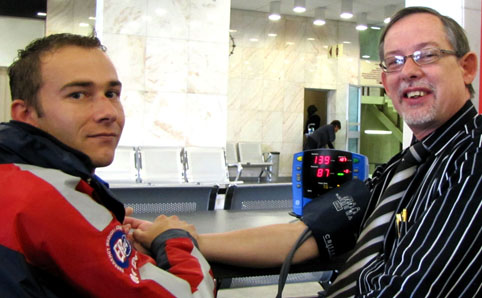Latest News Archive
Please select Category, Year, and then Month to display items
02 January 2025
|
Story Gerda-Marie van Rooyen
|
Photo Supplied
 Leading the research in South Africa is Prof Linus Franke from the Department of Soil, Crop and Climate Sciences.
Leading the research in South Africa is Prof Linus Franke from the Department of Soil, Crop and Climate Sciences.
Scientists are actively pursuing the successful breeding of diploid hybrid potatoes from inbred lines. This is expected to revolutionise potato breeding as it holds the key to rapid genetic progress. It will introduce new varieties for commercialisation through seed. Currently, existing potato variants have a gene that renders self-pollinated seeds infertile.
Prof Linus Franke, an academic in the Department of Soil, Crop and Climate Sciences at the UFS, is leading the research in South Africa. “This technology allows the production of genetically uniform potato seed that is easy to transport and largely disease-free.” He says this differs from conventional breeding whereby only vegetative propagation is possible due to tetraploid varieties in potatoes. It also risks carrying pests and diseases from one generation to the next – leading to the accumulation of pests and diseases with each round of multiplication.
Seed innovation
Prof Franke explains that Solynta BV, a seed company based in the Netherlands that produces potato varieties that can be grown from seed, has included South Africa in their research efforts because it is one of Africa’s largest producers and exporters. Through his academic relationship with Wageningen University and Research, a Dutch institution renowned for its agricultural endeavours and food production, the UFS became involved in researching hybrid potatoes grown from seed.
Diploid seeds containing two sets of chromosomes allow easier gene manipulation to increase predictability and speedier genetic progress. The breeding approach enables the incorporation of tolerance to pests, diseases, abiotic stresses (cold, heat, drought) and other desired genetic traits.
Although Prof Franke is optimistic about this research, he is not blind to disadvantages. “Potato seeds are tiny and have little energy reserves, making it harder to grow potatoes from seed than from tubers.” He says potatoes from seed will take longer to cultivate than tubers, as farmers need to grow plantlets from seeds first, adding six weeks to the growing period. “It is possible that commercial farmers can grow potatoes directly from seed. Alternatively, perhaps more likely, specialised growers will produce tubers of potatoes from seed; these tubers are then sold as seed tubers to other potato farmers, who then continue their normal practices of producing potatoes for the market from tubers.”
Financial benefits
Prof Franke says farmers have reason to get excited. “Seed potatoes will reduce input costs, as varieties with enhanced tolerance to pests and diseases require less pesticides. Planting one hectare of potatoes requires three to four tonnes of potato tubers, but only one 25 g packet of potato seeds.” Since potatoes are a more valuable commodity than maize, this technology might also increase farmers’ income potential.
"May Month of Compassion" for UFS staff
2011-05-04
 |
|
From the left: Louis van Wyk (Central Region, Events Coordinator of ER 24) and Prof. Gert van Zyl, Dean of the Faculty of Health Sciences
Photo: Gerda-Marie Viviers
|
The Health and Wellness Centre of our university has kick-started the “Action of Compassion” which is aimed at promoting physical health for staff members of our university. This initiative is done in collaboration with Medi-Clinic and Pathcare who will be offering medical screening tests from 3 May 2011 until 13 May 2011. This forms part of the “Wake up to your Wellness – Take Control” programme of the Health and Wellness Centre. The tests will be done at 27 stations across our Main Campus. On 16 May the Wellness Centre will be at the South Campus and the date for a visit at the Qwaqwa Campus is to be established later. “The reason why we are doing this, is to conduct a research on Staff Wellness, give the staff feedback on their health and to create a database using the information we receive, so we can evaluate the health of our staff members and have them view their own status over time and whether they are making the right wellness choices,” said Dr Annette Prins.
This is a once-a-year initiative. Last year an estimated 1 100 staff members participated. This year the Health and Wellness Centre hopes to increase the figures. The medical screenings will include services like blood pressure, weight, height and BMI which will be conducted by Medi-Clinic and the cholesterol and blood glucose screenings will be conducted by Pathcare.
4 May 2011